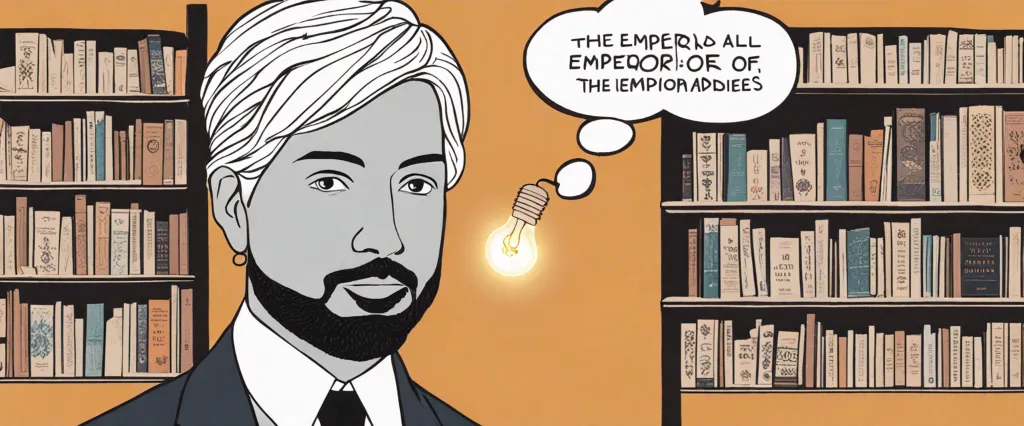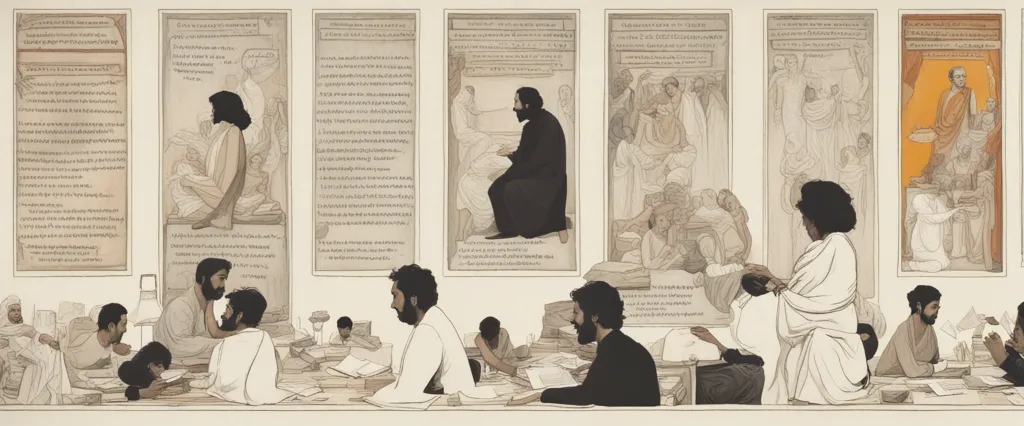
The field of medicine has long been a subject of fascination, exploration, and constant evolution. From groundbreaking discoveries to infectious diseases that have plagued humanity, it is through the written word that we have attempted to understand the powerful forces that shape our health and wellbeing. This comparative study delves into two exceptional books, Siddhartha Mukherjee’s “The Emperor of All Maladies” and Eula Biss’s “On Immunity,” both of which provide insightful narratives on the complex world of medicine, disease, and human existence.
“The Emperor of All Maladies” by Siddhartha Mukherjee is a monumental work that meticulously traces the history of cancer, providing an in-depth exploration of the disease through the lenses of science, culture, and society. Mukherjee, an accomplished oncologist himself, weaves together stories of patients, researchers, and clinicians as he unravels the mysteries surrounding this formidable enemy. By seamlessly blending his medical expertise with the narrative prose, Mukherjee presents a book that not only educates but also resonates with readers on an emotional level.
In contrast, Eula Biss’s “On Immunity” takes a unique approach by delving into the lesser-known but equally significant topic of vaccination. Biss, an acclaimed essayist and writer, explores the intricacies of immunization, examining the social, political, and philosophical implications surrounding this divisive topic. Drawing from personal experiences, historical influences, and cultural narratives, Biss taps into the often unexplored pathos of the vaccination debate, unraveling its complexities with compassion and intellect.
Both Mukherjee and Biss approach the subjects of cancer and immunization, respectively, through a multidimensional lens, propelling their books beyond mere volumes of medical information. By intertwining personal narratives, historical anecdotes, and engaging storytelling techniques, they transform what could be considered dry topics into compelling narratives that probe the very essence of human life and the pursuit of health.
Despite their differing focuses, both authors share a common goal – to spark dialogue, broaden perspectives, and shed light on the complex and deeply intertwined nature of medicine and our existence. Through their distinct voices and thought-provoking narratives, “The Emperor of All Maladies” and “On Immunity” become literary works that not only inform but also challenge readers to question the prevailing notions surrounding illness, healthcare, and our collective responsibility towards health.
This comparative study will embark on a journey through both books, exploring the similarities and differences in their approaches, themes, and impact. By delving into the techniques employed by Mukherjee and Biss, we aim to understand how their diverse perspectives contribute to our understanding of medicine while also engaging with the larger questions surrounding identity, community, and the human condition.
In this exploration of “The Emperor of All Maladies” and “On Immunity,” we aim to uncover the power of literature to illuminate and elevate our understanding of the complexities of medicine and the challenges we face as individuals and as a society. As we delve into their narratives, we immerse ourselves in a realm where science meets storytelling, where vulnerability intertwines with resilience, and where the pursuit of knowledge becomes intertwined with the human pursuit for health, understanding, and compassion.
Brief Summary of Two Books
The Emperor of All Maladies by Siddhartha Mukherjee
“The Emperor of All Maladies: A Biography of Cancer” by Siddhartha Mukherjee is a comprehensive and groundbreaking exploration of the history, science, and treatment of cancer. Written in a narrative style, the book takes readers on a journey that spans centuries, beginning with the first documented cases of cancer in ancient Egypt and concluding in the present day.
Mukherjee delves into the lives and work of prominent scientists, doctors, and patients who have shaped our understanding of cancer. He explores the various theories and treatments that have evolved over time, from the early attempts at surgery and chemotherapy to the more recent discoveries of targeted therapies and immunotherapies.
The book not only illuminates the scientific progress in cancer research but also delves into the social and cultural aspects surrounding the disease. Mukherjee highlights the stigmatization of cancer and its impact on patients, as well as the societal shifts in perception and fundraising that have driven breakthroughs in treatment.
In addition to historical context, the book presents captivating stories of individuals who have battled cancer, drawing the reader in with their struggles, triumphs, and ultimate contributions to the fight against the disease. Mukherjee weaves together personal narratives, scientific explanations, and ethical considerations, offering a deep and multidimensional understanding of cancer as a disease and as a societal phenomenon.
“The Emperor of All Maladies” has been widely acclaimed for its ability to make complex scientific concepts accessible to a broad audience. It provides a comprehensive overview of the war against cancer, celebrating the progress made while acknowledging the challenges that still lie ahead.
On Immunity by Eula Biss
“On Immunity: An Inoculation” by Eula Biss is a non-fiction book that explores the highly controversial topic of vaccination and immunization. Biss, a new mother, delves into the history, science, and misinformation surrounding vaccines, unraveling the fears and concerns of parents that have led to the rise of the anti-vaccine movement.
Throughout the book, Biss examines the origins of vaccine opposition, drawing upon historical events like the smallpox epidemic and the invention of the smallpox vaccine. She also delves into the concept of collective immunity, exploring the idea that vaccines not only protect individuals but also help to safeguard the most vulnerable members of society.
Biss artfully weaves personal anecdotes and experiences into her research, reflecting on her own fears and doubts as a mother. She takes a compassionate and understanding approach towards parents who are hesitant about vaccinating their children, acknowledging the complexity of the issue and the societal pressures at play.
Furthermore, Biss delves into the influence of social and cultural factors on vaccination decisions. She explores how fear, mistrust, and the spread of misinformation through social media have contributed to the rise of the anti-vaccine movement. Biss addresses the responsibility of medical professionals, as well as the media, in combating this surge of misinformation and instilling public confidence in immunization.
“On Immunity” ultimately argues for the importance of vaccines and their role in maintaining public health. Biss presents a compelling case for vaccination by providing scientific evidence, historical context, and personal reflections. Her thought-provoking exploration encourages readers to question their own beliefs and consider the wider implications of vaccine hesitancy.
Comparison between Two Books

Similarities in Medicine
The Emperor of All Maladies by Siddhartha Mukherjee and On Immunity by Eula Biss are both thought-provoking books that explore different aspects of medicine. Despite their differences in terms of focus and approach, there are several similarities when it comes to their discussions on medicine. Here are some key similarities:
1. Historical Context: Both books provide a historical context for the evolution of medicine. The Emperor of All Maladies traces the history of cancer treatment, while On Immunity explores the historical controversies and debates surrounding vaccination. Both authors delve into the past to shed light on how medicine has navigated complex challenges over time.
2. Scientific Progress: Both books emphasize the importance of scientific progress in the field of medicine. Siddhartha Mukherjee explores the development of various cancer treatments and the incremental advancements made throughout history. Eula Biss, on the other hand, discusses the scientific foundation and research behind vaccination, including the successes and challenges faced.
3. Social and Cultural Impact: Both authors address the social and cultural impact of medical advancements. Mukherjee explores the stigma associated with cancer, how it has changed over time, and its effects on patients and society. Similarly, Biss examines the societal debates surrounding vaccination, including concerns about safety, ethics, and the influence of misinformation.
4. Ethical Dilemmas: Both books delve into the ethical dilemmas that arise in the field of medicine. Mukherjee raises questions about the balance between aggressive treatments and patient comfort, as well as the ethics of clinical trials. Biss explores the concept of individual and collective responsibility in vaccination, as well as the ethical implications of prioritizing public health.
5. Personal Narratives: While The Emperor of All Maladies is predominantly focused on the history of cancer, Mukherjee also incorporates personal narratives and experiences of patients, which humanizes the medical aspect. Similarly, On Immunity includes personal anecdotes and experiences of the author to provide a relatable and emotional perspective on vaccination.
Overall, these two books highlight the interconnectedness of medicine with history, science, society, and ethics. They emphasize the complexity of medical challenges and the ongoing quest for advancements while acknowledging the human aspect behind healthcare.
Divergences in Medicine
The Emperor of All Maladies by Siddhartha Mukherjee and On Immunity by Eula Biss are both thought-provoking books that explore different aspects of medicine. While the former provides a comprehensive history of cancer and its treatment, the latter delves into the societal and cultural factors surrounding vaccination.
One notable divergence between these books lies in their primary focus. Mukherjee’s The Emperor of All Maladies concentrates on cancer as a disease and its historical impact on society. It follows the evolution of cancer research, from the early days of crude treatments to the development of targeted therapies. The book offers an extensive analysis of scientific advances and the way cancer has shaped medical practices. On the other hand, Biss’s On Immunity looks beyond the virus or disease itself and examines the social, philosophical, and emotional aspects associated with vaccination. While medicine remains an integral part of the discussion, the emphasis is on societal perspectives, myths, and fears surrounding immunization.
Another divergence lies in the narrative style and tone of the two books. Mukherjee’s writing in The Emperor of All Maladies is more academic and clinical, utilizing scientific jargon to present detailed research and clinical studies. The book demonstrates an objective and authoritative approach towards cancer, providing a comprehensive account that blends medical history with personal narratives. In contrast, Biss’s On Immunity takes a more personal and intimate approach. She combines personal anecdotes, cultural references, and historical events to explore the fears and misconceptions around vaccines. The tone is more conversational, engaging the reader in a thought-provoking dialogue rather than presenting dense medical information.
Furthermore, the scope of these books varies significantly. While The Emperor of All Maladies is an in-depth exploration of cancer, spanning centuries of research and covering various aspects from basic science to clinical trials, On Immunity has a narrower focus on vaccination. Biss explores the historical, ethical, and cultural contexts around vaccines and examines the factors that contribute to vaccine hesitancy or refusal.
Overall, the divergence in these books stems from their different subjects and perspectives. The Emperor of All Maladies predominantly deals with the scientific and medical aspects of cancer, providing a comprehensive overview of its history and treatment, while On Immunity delves into the societal, cultural, and emotional aspects of vaccination, questioning beliefs and addressing common concerns.

Conclusion
Both The Emperor of All Maladies by Siddhartha Mukherjee and On Immunity by Eula Biss are highly acclaimed books that delve into important topics related to health and society. Ultimately, the choice between the two depends on personal interests and preferences.
The Emperor of All Maladies is a comprehensive exploration of cancer, its history, treatments, and the social impact it has had over the centuries. Mukherjee weaves together scientific facts, personal stories, and historical anecdotes to provide a gripping and informative account of one of the deadliest diseases. It is a highly regarded book that won the Pulitzer Prize for General Nonfiction in 2011.
On Immunity, on the other hand, delves into the topic of vaccinations and examines the fears, myths, and misconceptions surrounding them. Eula Biss combines personal experiences, cultural references, and scientific research to analyze the concept of immunity and the importance of vaccination for public health. This book raises questions about individual choices and societal responsibilities in the realm of public health.
Ultimately, both books are worthy of reading, and both offer unique perspectives on important health-related topics. If you are more interested in cancer and its history, The Emperor of All Maladies would be a great choice. However, if you are interested in exploring the complex issues surrounding immunizations and public health, On Immunity would be more suitable.

